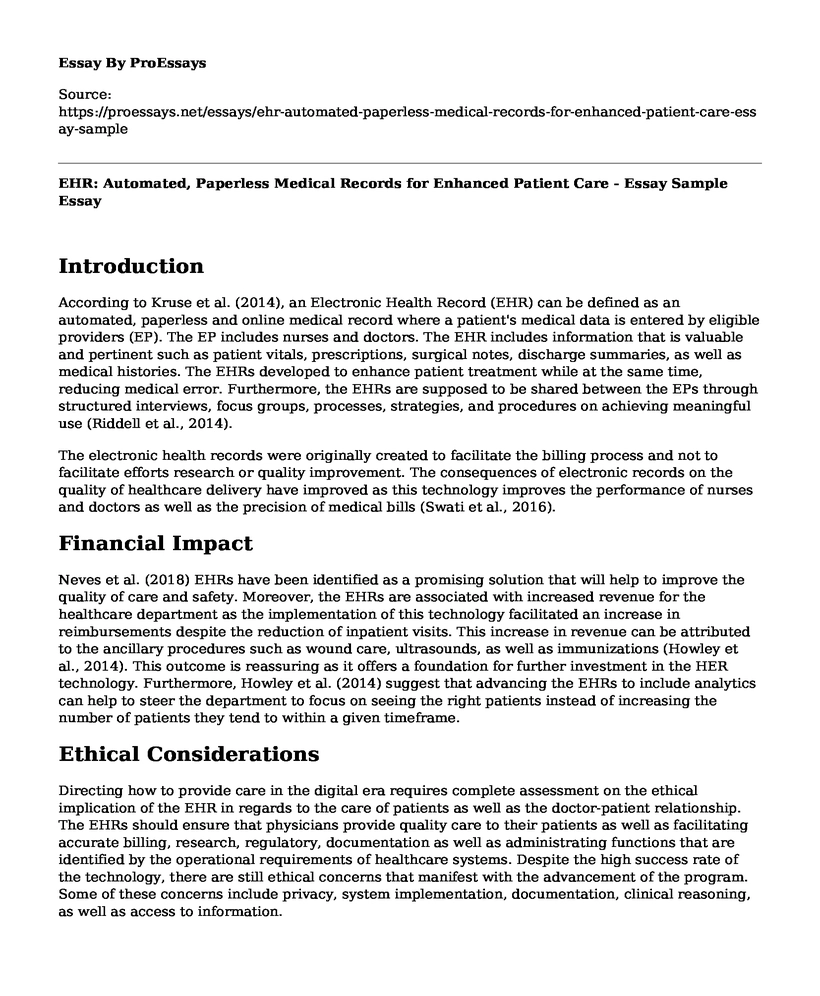Introduction
According to Kruse et al. (2014), an Electronic Health Record (EHR) can be defined as an automated, paperless and online medical record where a patient's medical data is entered by eligible providers (EP). The EP includes nurses and doctors. The EHR includes information that is valuable and pertinent such as patient vitals, prescriptions, surgical notes, discharge summaries, as well as medical histories. The EHRs developed to enhance patient treatment while at the same time, reducing medical error. Furthermore, the EHRs are supposed to be shared between the EPs through structured interviews, focus groups, processes, strategies, and procedures on achieving meaningful use (Riddell et al., 2014).
The electronic health records were originally created to facilitate the billing process and not to facilitate efforts research or quality improvement. The consequences of electronic records on the quality of healthcare delivery have improved as this technology improves the performance of nurses and doctors as well as the precision of medical bills (Swati et al., 2016).
Financial Impact
Neves et al. (2018) EHRs have been identified as a promising solution that will help to improve the quality of care and safety. Moreover, the EHRs are associated with increased revenue for the healthcare department as the implementation of this technology facilitated an increase in reimbursements despite the reduction of inpatient visits. This increase in revenue can be attributed to the ancillary procedures such as wound care, ultrasounds, as well as immunizations (Howley et al., 2014). This outcome is reassuring as it offers a foundation for further investment in the HER technology. Furthermore, Howley et al. (2014) suggest that advancing the EHRs to include analytics can help to steer the department to focus on seeing the right patients instead of increasing the number of patients they tend to within a given timeframe.
Ethical Considerations
Directing how to provide care in the digital era requires complete assessment on the ethical implication of the EHR in regards to the care of patients as well as the doctor-patient relationship. The EHRs should ensure that physicians provide quality care to their patients as well as facilitating accurate billing, research, regulatory, documentation as well as administrating functions that are identified by the operational requirements of healthcare systems. Despite the high success rate of the technology, there are still ethical concerns that manifest with the advancement of the program. Some of these concerns include privacy, system implementation, documentation, clinical reasoning, as well as access to information.
In regards to privacy and confidentiality, healthcare establishments, as well as insurance companies, will need access to information EHRs are to perform as intended. Therefore, it is essential to identify to what extent privacy and confidentiality of patient details should be observed. Moreover, the institutions should ensure that they secure the patient's information. Such steps include strong security and privacy policies (Ozair et al., 2015). In regards to system implementation, every healthcare organization encounters challenges that can result in wastage of resources. The creation implementation, as well as maintenance of EHRs, needs sufficient funds and inclusion of people such as clinicians, educators, clinicians, and consultants. Therefore, clinicians should guide their colleagues to help them understand their responsibility in advancing EHRs (Ozair et al., 2015). Sulmasy et al. (2017) explain that institutions should ensure that patients can access their information even though the majority of the patients are not aware of this right. Furthermore, in regards to documentation, doctors should ensure that the patient records are updated every time the patient attends the hospital instead of copy-pasting the previous information. Finally, in terms of clinical reasoning, the institutions should ensure that the phrases used by EHRs to discourage superficial clinical thinking as well as interaction (Sulmasy et al., 2017).
References
Howley, M. J., Chou, E. Y., Hansen, N., & Dalrymple, P. W. (2014). The long-term financial impact of electronic health record implementation. Journal of the American Medical Informatics Association, 22(2), 443-452. doi:10.1136/amiajnl-2014-002686
Jamshed, N., Ozair, F., Sharma, A., & Aggarwal, P. (2015). Ethical issues in electronic health records: A general overview. Perspectives in Clinical Research, 6(2), 73. doi:10.4103/2229-3485.153997
Kruse, C. S., Stein, A., Thomas, H., & Kaur, H. (2018). The use of Electronic Health Records to Support Population Health: A Systematic Review of the Literature. Journal of Medical Systems, 42(11). doi:10.1007/s10916-018-1075-6
Riddell, M. C., Sandford, K. G., Johnson, A. O., Steltenkamp, C., & Pearce, K. A. (2014). Achieving Meaningful Use of Electronic Health Records (EHRs) in Primary Care: Proposed Critical Processes from the Kentucky Ambulatory Network (KAN). The Journal of the American Board of Family Medicine, 27(6), 772-779. doi:10.3122/jabfm.2014.06.140030
Sulmasy, L. S., Lopez, A. M., & Horwitch, C. A. (2017). Ethical Implications of the Electronic Health Record: In the Service of the Patient. Journal of General Internal Medicine, 32(8), 935-939. doi:10.1007/s11606-017-4030-1
Yanamadala, S., Morrison, D., Curtin, C., McDonald, K., & Hernandez-Boussard, T. (2016). Electronic Health Records and Quality of Care. Medicine, 95(19), e3332. doi:10.1097/md.0000000000003332
Cite this page
EHR: Automated, Paperless Medical Records for Enhanced Patient Care - Essay Sample. (2023, Jan 29). Retrieved from https://proessays.net/essays/ehr-automated-paperless-medical-records-for-enhanced-patient-care-essay-sample
If you are the original author of this essay and no longer wish to have it published on the ProEssays website, please click below to request its removal:
- Fetal Alcohol Spectrum Disorder
- Children's Mercy Healthcare Facility Analysis
- Impacts of Cancer on the Mental Health of School-Going and Cancer Patients
- Research Paper on Educational and Professional Goals and the DNP Degree
- Essay Sample on Thyroid Disease: Prevalent Health Risk in Adults 35-65
- Essay Example on Ageing Mobility: Key to Global Age-Friendly Cities Project
- Essay Sample on Eating Healthy on a Budget: Balancing Cost and Nutrients







